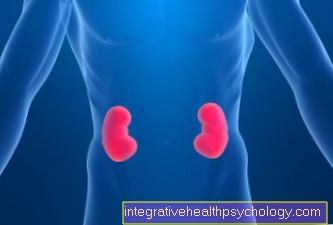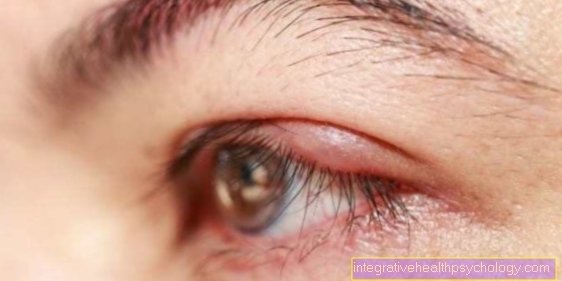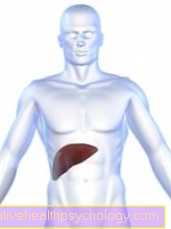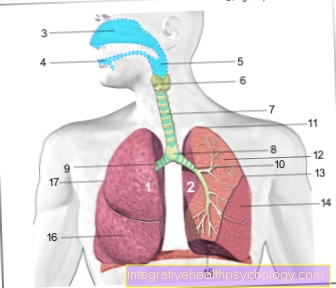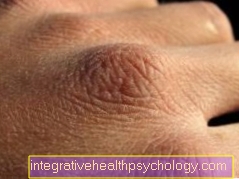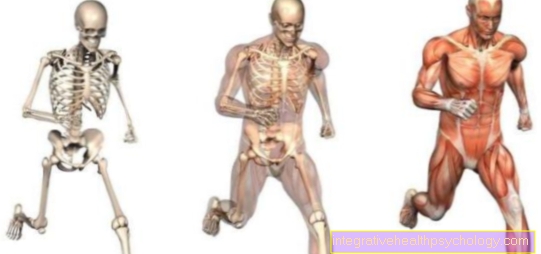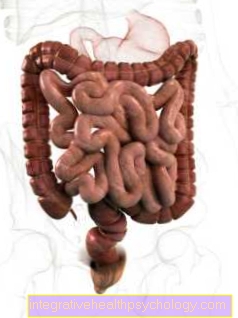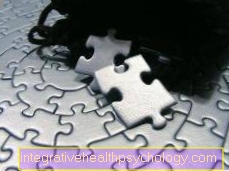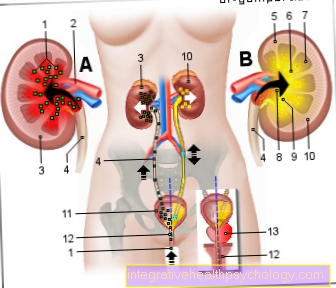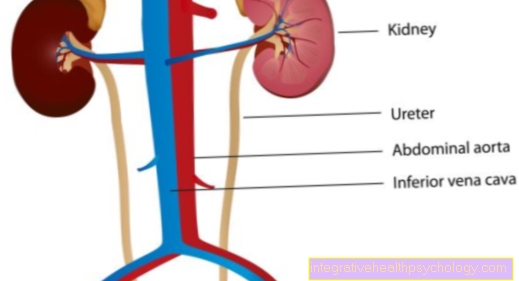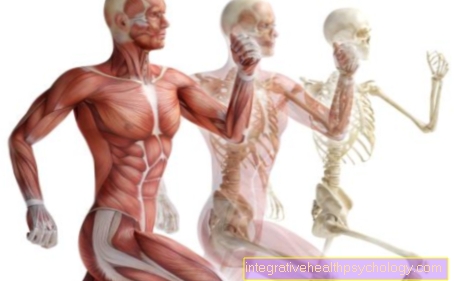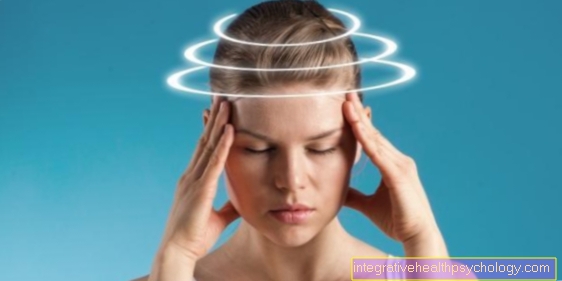amnesia
Synonyms
Memory gap, "film tear"
definition
The amnesia is a mostly temporary disorder of the Memory for the temporal orientation or the content reminder. Amnesia is a symptom that can occur in a variety of triggering disorders or factors and must be differentiated from dementia diseases (dementia) in which the memory disorder is slow and persistent.

causes
With many disturbing influences on the brain, impairment of consciousness and memory can occur, which e.g. by the influence of poisons, in the form of alcohol, medication (e.g. tranquilizers), but also drugs. Furthermore, violent effects of all kinds (mechanical, electrical) on the brain lead to memory gaps, which in the case of concussion as the mildest form of traumatic brain injury is also diagnostically groundbreaking. Brain diseases such as epilepsy, stroke or inflammation of various causes and migraines can also lead to amnesia. Finally, psychiatric illnesses such as personality disorders, dissociative disorders and hypnosis should also be mentioned, which can also lead to a loss of consciousness or memory.
Amnesia after accident / trauma / fall
If the violence in the context of an accident leads to an injury to the brain, one speaks of a traumatic brain injury. This can also be due to a fall on the head. Different degrees of severity can be distinguished based on the duration of the unconsciousness. The weakest form of cranial brain trauma is one concussion. The patient is only unconscious for a short time (up to a maximum of 10 minutes). A typical symptom is retrograde amnesia. The patient cannot remember exactly how the accident happened. Nausea and vomiting appear as accompanying symptoms.
Loss of memory for future events, known as anterograde amnesia, is less likely to occur with mild brain injuries. This form of amnesia can occur in more severe brain injuries when nerve cells are compressed by bleeding or edema. If the accident has caused extensive irreversible damage to the nerve cells, then the amnesia will persist. Memory training can help to activate other areas of the brain in order to compensate for the loss of function.
Amnesia from stress
Amnesia can also be triggered by stress. For one, it can become a dissociative amnesia come. This form of amnesia leads to selective memory gaps in relation to autobiographical memories. Experts understand dissociative amnesia as a kind of protective function of the psyche in order not to have to repeatedly deal with stressful events. But also with the transient global amnesia Stress plays an important role as a trigger. It occurs particularly often after previous physical and psychological stressful situations. As if the brain were taking a short break. After 24 hours at the latest, the memory gap closes again and the patient's memory is no longer restricted.
Amnesia from alcohol
After excessive alcohol consumption, a so-called blackout come. The person concerned has a memory gap of up to several hours. This is a temporary amnesiai.e. the memory recovers over time. It is very different from what amount of alcohol an amnesia is triggered.
With chronic alcohol consumption, a vitamin B1 deficiency can lead to the development of a Korsakov syndrome come. The main symptom of this disease is amnesia. This sometimes exists in a global form, i.e. Both experienced events and new content can no longer be accessed. Often, however, old memory contents are easy to remember. However, the patients cannot remember what they have experienced. Those affected unconsciously fill these gaps in their memories with fantasy. This is called confabulation in technical terms and is a typical symptom of Korsakov's syndrome.
Amnesia after a stroke
A memory loss or memory impairment after a stroke frequently. The type and extent depend on which brain area is affected and how severely it is damaged. People who have had a left-brain stroke often have problems with semantic memory. Affected people can no longer remember factual knowledge well. The memory of personal experiences is not disturbed. This is more common after a stroke in the right hemisphere; this is where episodic memory is located. Often these disorders are only temporary or at least partially regress. However, if the stroke leads to the death of nerve cells in large areas, the amnesia is permanent.
You can find more information on stroke here: stroke
Amnesia after an epileptic fit
Epileptic seizures go very often associated with amnesia. The type and extent can vary greatly from patient to patient. Most of the time, the amnesia after an epileptic seizure is only temporary and resolves quickly. In a rare form of Temporal lobe epilepsy amnesia is the only symptom. This leads to recurrent memory disorders without any other accompanying symptoms. Of the epileptogenic focus will be in Hippocampus supposed. Here in the EEG abnormalities can also be detected. The most important differential diagnosis is transient global amnesia.
Amnesia after surgery
After surgical procedures, patients are postoperative frequent memory impairment noticed. These are short-lived and mostly relate to events immediately before or after the procedure. This is usually related to the medication that the patient is given to induce anesthesia. Therefore, the memory gap is even desired, after all, many patients perceive these experiences as sometimes traumatic. After neurosurgical interventions on the skull, the amnesia can also extend beyond the immediately postoperative phase. In older patients, too, it is repeatedly observed that memory disorders persist for a long time after the operation. It is unclear whether this should be seen as a harbinger of the development of dementia.
This article might also interest you: Aftermath of general anesthesia
Amnesia upon waking
A wake-up amnesia is often part of a Drowsiness. In this state, after waking up, the person concerned is disoriented with regard to place and time. This is also associated with a psychomotor slowdown. Usually this state lasts for a maximum of 15 minutes. The memory of that time is fragmentary. It is characteristic of this sleep disorder that it occurs during deep sleep. It can be provoked by being awakened, but it also occurs during spontaneous awakening.
What types of amnesia are there?
The different types of amnesia can be distinguished based on the following characteristics. First of all, one differentiates between Period of memory loss. At a anterograde amnesia the ability to remember future events is lost. At a retrograde amnesia the patient can no longer remember things that happened before the triggering event. Often only memories were lost immediately before the event. In the case of anterograde amnesia, the everyday restrictions are severe for the patient, as he can no longer remember any new content.
In addition, one can get the amnesia after her scope distinguish. In the dissociative amnesia there is only an incomplete loss of memory related to the triggering event. A global amnesia occurs when the patient no longer remembers events that occurred a long time ago and can no longer save any new content. This is the most severe form of memory disorder. This can be temporary. Then one speaks of one transient global amnesia. Furthermore, one can still see the amnesias based on them root cause organize. In addition to organic disorders like Strokes, Cerebral hemorrhage, Craniocerebral trauma Amnesia can also be psychogenic, e.g. be conditioned by a traumatic experience.
Anterograde amnesia
At a anterograde amnesia if the patient suffers from a memory disorder in which the memory for new content is massively restricted. Reminders after the start of the triggering event cannot be saved and will be lost again after a short time. Anterograd means facing forward; here in relation to the temporal dimension. There is anterograde amnesia more often than the retrograde form and has serious everyday restrictions for the person affected. The causes of anterograde amnesia are numerous: concussions, epileptic seizures, dementia, Strokes, brain tumors or poisoning with neurotoxic substances.
The type and extent of amnesia can vary greatly depending on the trigger. This also applies to the corresponding accompanying symptoms. For the treatment of anterograde amnesia, it is crucial to know the underlying cause of the amnesia. It should therefore be the primary treatment goal Treat underlying disease. With memory training, an attempt can be made to activate other areas in the brain in order to better compensate for the functional failure. However, if there is extensive death of nerve cells, the amnesia is often permanent. There is then no cure.
Retrograde amnesia
In retrograde amnesia, there is a memory loss related to a previous event. The affected person has no memory of things that happened before the triggering event. However, the memory gap is usually relatively small, i.e. it is only about the short period immediately before the triggering event. Events further back are often well remembered. There is also no relationship between the extent of the brain damage and the duration of the memory loss. Various factors are known to trigger retrograde amnesia. This is often the case after a head trauma. The person concerned does not remember what happened in the accident.
Psychogenic triggers are also possible.Memory loss occurs after a traumatic life event. The experience cannot be remembered. Retrograde amnesias have also occurred in the course of neurosurgical interventions. This can usually also be the case after electroconvulsive therapy. Most of the time, retrograde amnesia is a short-term condition; long-term memory in relation to future memory is mostly unaffected.
Read more about this: Retrograde amnesia
Transient global amnesia
Transient global amnesia is a temporary memory disorder. In the context of which the affected patient can no longer access past memories. In addition, the ability to remember new content is massively restricted. However, awareness is preserved. Those affected can usually still carry out routine tasks without major restrictions. To outsiders, however, they usually appear disoriented and worried. Often the same questions are repeated by the patient. The cause are temporarily existing circulatory disorders in the area of the Basilar artery; an artery that supplies large parts of the brain with oxygen. The memory loss is only temporary, lasting on average between 6 and 8 hours. After 24 hours the symptoms should have completely resolved, otherwise one can no longer speak of a transient amnesia.
Read more on the topic: Transient Global Amnesia
Dissociative amnesia
In dissociative amnesia, it happens selective memory gaps in relation to autobiographical memories. These memory gaps can range from minutes to decades. In order to be able to make a diagnosis of dissociative amnesia, various organic causes for amnesia must be ruled out. Imaging of the brain is essential in order not to overlook any organic brain disorders. Intoxication can also lead to amnesia and should be ruled out. In dissociative amnesia, there is a close connection between the memory gap and stressful or traumatic experiences. Therefore, the disorder is also limited to autobiographical memory.
Acquired skills are remembered. Experts understand dissociative amnesia as a type Protective function of the psychein order not to have to repeatedly deal with stressful events. Therefore, psychotherapy is useful for those affected. Here, under psychotherapeutic guidance, they learn to work through the stressful experiences in their biography.
Symptoms
The person concerned reports that they can no longer remember certain daily events. Depending on whether the amnesia occurred before, after, during, or before and after a triggering event, one speaks of a retrograde amnesia (no memory of things before the event), one anterograde amnesia (no memory of things from the event), or one global amnesiain which there is a memory deficit before and after a triggering event. The consciousness of a corresponding person can appear normal in the period of time that is no longer remembered afterwards, but if the brain is impaired accordingly, the current consciousness is often disturbed. Motor skills (Walking, cycling) can be exercised by people even with partially impaired consciousness.
diagnosis
Finding a amnesia usually only takes place by asking a patient whether he has noticed gaps in his memory and whether there were triggering factors. By a Foreign anamnesis (Interviewing third parties) the assessment can be completed as to whether the patient has certain deficits in memory despite being (partially) conscious.
Therapy and prophylaxis
As a rule, the episode of amnesia is limited, which is why direct therapy is neither possible nor necessary. Only the causative disorder or disease can be searched for, treated or avoided, e.g. epilepsy, symptoms of intoxication and other brain diseases.
Can amnesia resolve again?
Whether amnesia is permanent in a patient is primarily determined by the cause of the amnesia. Does the patient have a dementia so the memory loss will continue to progress over time. After mild Traumatic brain injury Amnesia is often only temporary and memory returns. In the case of cerebral haemorrhage or tumors, the nerve tissue must be relieved of mechanical pressure, which often improves the amnesia. Memory training can help to activate other areas of the brain in order to compensate for the loss of function. However, if there is extensive death of nerve cells, the amnesia is often permanent. There is then no cure.

